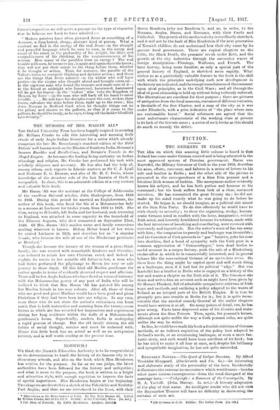FICTION.
THE GERMANS IN CORK.•
THE ides on which this amusing little volume is based is that Ireland has come under German control and is losing educated in the most approved system of Prussian government. Baron von Kartoffel, the Military Governor of Cork in the year 1918, describes his aims, efforts, successes, and failures in a series of letters to his wife and brother in Berlin ; and the other side of the picture is presented in the correspondence of a Sinn Fein peasant and a frivolous Irish woman of fashion. The anonymous author evidently !mows his subject, and he has both pathos and humour at his command ; but his book suffers from lank of a clear, sustained intention. He has committed the great literary sin : be did not make tip his mind exactly what ho was going to do before he started. Ho began it, we should imagine, as a political skit aimed at the Sinn Fein Party. To do this effectively he would have to stick closely to actuality ; to show the organizing, stodgy, bureau- cratic German mind in conflict with the loose, imaginative, critical Irish mind, and honestly bewildered because its reforms, made with the best intentions of benefiting and conciliating, were received with contnunely and ingratitude. But the writer's sense of fun ran away with him ; the temptation to parody and burlesque was irresistible ; and his Governor of Cork proceeds to " gas " lunatics, poke his nose into dustbins, find a bond of sympathy with the Cork poor in a common appreciation of " Guirmessbygor," turn dead bodies to useful account in a corpse factory, /nigh the sale of a Hindenburg cinder-sifter in which he is commercially interested, end in general behave like the conventional German of en up-to-date revue. On these lines the thing might be capital sport and well worth doing as a burlesque, even if it had lost its political "edge." But von Kartoffel has a brother in Berlin who is engaged on a history of the war and wants a chapter on the Irish side of it. The Governor sits down and writes him an account such as might have been given by Sir Horace Plunkett, full of admirable sympathetic criticism of Irish ways and methods, and outlining a policy adapted to the wants of Ireland as an integral part of the British Empire. It is true ho promptly gets into trouble at Berlin for it ; but it is quite incon- ceivable that the musical comedy General of the earlier chapters would have written it at all. On many points of detail, too, he has gone wrong. Facts have disproved some of his theories and state- ments about the Sinn Feiners. Then, again, his peasant's letters, although not quite unlike the way a Cork peasant talks, aro quite unlike the way he writes.
In fine, be could have made his book a forcible criticism of German methods, or an indirect exposition of the policy beat adapted to Ireland's needs, or an entertaining burlesque, or even a mere fan- tastic story, and each would have boon excellent of its kind ; but he has tried to make it all four at once, and, despite his brilliancy and sympathetic imagination, he has not quite succeeded.


























 Previous page
Previous page